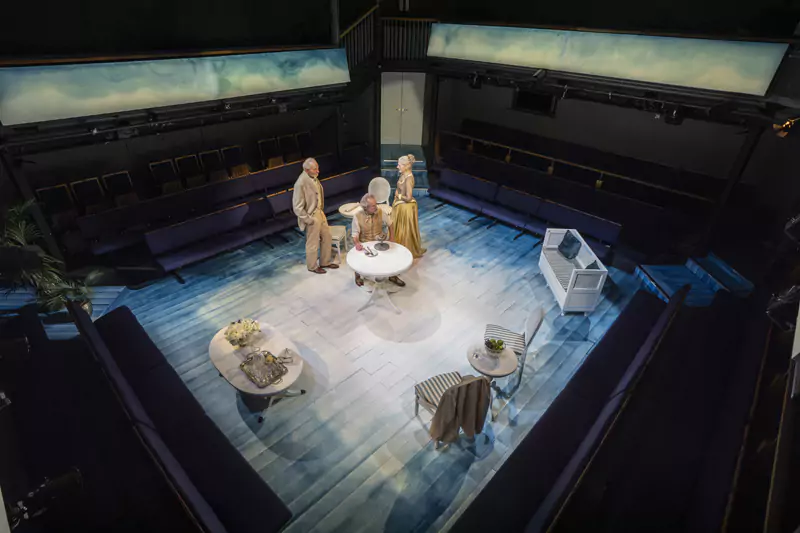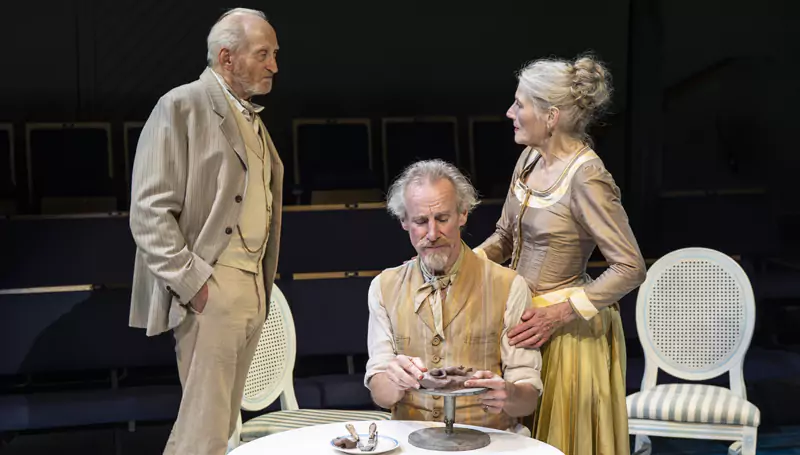“Creditors” at Orange Tree Theatre
Simon Jenner in South West London
14 September 2025
*****
Tom Littler and Howard Brenton have enjoyed what the latter terms “a long affair” with Strindberg going back more than ten years. Brenton’s version of Creditors, worked from Agnes Broomé’s literal translation, was premiered in 2019 at Jermyn Street Theatre by Littler when he was artistic director there. Now he revives the play as head of the Orange Tree Theatre. Though again staged in period, the revival’s dynamics are different, in several ways more convincing. In a starry production, this time stranger Gustaf is played by Charles Dance, artist Adolf by Nicholas Farrell, and his wife the novelist Tekla by Geraldine James – the first time all three have appeared together since The Jewel in the Crown on TV in 1984.

Charles Dance, Nicholas Farrell, Geraldine James.
Photo credit: Ellie Kurtz
Brenton’s full version seems close to Strindberg’s twists of manipulation. There are times when contemporary colloquial speech leads to a tiny flinch: “meltdown” late on seems a touch unnecessary, but otherwise nothing distracts from Strindberg’s sinewy directness.
Vocally every note is struck by the trio: dynamics rise as if orchestrated. Physically the swivels are delicate but with Dance there’s a deadly energy, nicely contained. A light-toned Machiavel, he notably shifts timbres when addressing Farrell and James, and back. Farrell mixes wide-eyed ingenuousness with a decorous petulance; fragmenting bonhomie gives way to tremulous accusations. James buttonholes with warm mastery, happy “to take the initiative” as Gustaf has preternaturally warned Adolf and “usurped the man’s basic right”. Strindberg’s text seethes with misogyny, but one here where the woman isn’t the one with “vicious appetites”. James resorts to playful purrs and steely watchfulness, then snaps: more with Dance than Farrell.
There’s none of the physical extremes you see in some productions, but Creditors is one of the most nuanced of Strindberg’s strident output. The title – here the language of male ownership – is a mantra the mysterious Gustaf keeps introducing: what he feels he’s owed, what he pretends he feels Adolf’s owed. This production brings all this out even more clearly than its 2019 predecessor. Rationale is flayed bare. It feels more complete.
Creditors benefits from the chamber feel of the Orange Tree: its in-the-round layout insinuates the play’s claustrophobia, with two exits providing no relief as Strindberg decrees ominous knocking. Several creatives from 2019 return here. Louie Whitemore’s design now evokes Strindberg’s own impressionist seascapes. On gallery-affixed panels and stage floor a sprayed-white ground allows cerulean and ultramarine blues through, with a touch of Prussian. It’s played on by David Howe’s lighting which in turn suffuses hotel-room chairs; a table where Adolf mostly resides near his crutch. It’s a space where Tekla notes a game ominously lacks an owner.
Costumes are strictly in period, from Tekla’s golden dress to the white and light bronze waistcoats of the men. Max Pappenheim’s sound composition sketches a seaside’s tonal rise and fall, scored with distant foghorns.
Those foghorns sound like looming judgement. “All this is down to you” Adolf tells his eight-day friend Gustaf, having abandoned painting for sculpture under his intellectually commanding mentor. His wife has left him for some literary parties, Adolf complains: “I felt I couldn’t move, it was like she’d taken my crutches with her, out of spite!” Gustaf’s next door. Coincidence. Dance’s register shifts subtly from addressing a man with avuncular crudity, to the intellectual challenge of James. Farrell’s physically hamstrung Adolf is a study in incompleteness: an artist even in late career who can be traduced; someone to nudge to sickness.
Injured Adolf’s more experienced wife Tekla must be infantilizing him, Gustaf helpfully suggests. The duetting between Dance and Farrell is exquisite, and Farrell’s eyes light up. Tekla’s on her second marriage. Gustaf lets slip he’s seen Tekla flirting with young men; the same Tekla whom Adolf’s petulantly challenged as “an old hag” who can’t attract men. Tekla was originally in her early thirties.
Here the dynamics are reversed in essentially three scenes – Adolf, Gustaf; Adolf, Tekla; and Tekla, Gustaf – with the three only coming together with a long-delayed shock at the end. James purrs and cajoles, commands she’s addressed as “sister” and Farrrell’s Adolf is her “little brother”. Gustaf’s badgering Adolf to turn to sculpture is paradoxical given who’s doing the modelling. It’s a detail loaded with symbolism but no less fun as, very quickly Adolf is childed putty to Tekla’s sculpting; just as he was previously in a bromance. That current vanishes with the steel of Gustaf and Tekla’s exchanges.
Worldly, mutually charmed, Dance and James circle each other. Gustaf recalls the room was their honeymoon suite; he notes how “like” Tekla Adolf’s naked bust of her is. “Poor bloke. We stayed in this room, didn’t we?” To James’s burring “Stop it!” Dance commands “Look at me.” “I can, if I wish” James ripostes; though James and Dance look at each other straight away. At this point in the play, there’s a sudden action and you wait, tensed. Strindberg’s anxious to show at least one man can sexually subjugate Tekla, but it’s chillingly convincing as well as queasily comic. Poisoning husband and wife separately to each other, continually harking back to their sophisticated days and flaying hapless Adolf in front of Tekla, Gustaf’s revenge might seem complete. Gustaf though invests in Adolf too. Nevertheless, Gustaf recognizes in Tekla an equal to grapple with, in Adolf a distraction.
Tekla’s actions are gendered though, in as tortuous as fashion as Gustaf’s claiming to Adolf that her treatment of him leads to epilepsy and worse. It’s those misogynist cracks in psychology that leads to Creditors never being taken as the perfect masterpiece he claimed. Miss Julie is that. Creditors though runs it close, alongside The Father in the dramatist’s first great phase.
The abrupt denouement and loaded last line – a revelation to the speaker – is like nothing else. Leaving aside the raw sexuality sometimes (not always) seething in Creditors, this production overcomes Strindberg’s dodgy claims of epilepsy, substituting the frailty of age. In its sheer dynamic switchbacks and return volleys, it’s the masterpiece Strindberg deemed, if not his only one. Nuance and manipulation is all. And we’re unlikely to see a more nuanced, more intimate production of this still rarely performed disturber of ourselves.









